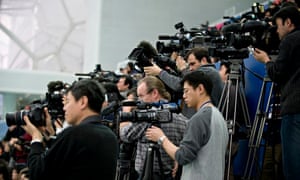Come up with a news story from the last 12 months for each of the categories suggested by Harriss, Leiter and Johnson:
- Conflict: Tension or surprise - War, e,g. Syrian Conflict
- Progress: Triumph or achievement - Politics - US Elections.
- Disaster: Defeat or destruction - Natural - Italy Earthquake.
- Consequence -Effects on individuals or community -
- Prominence
- Novelty
1)What example news story does the Factsheet use to illustrate Galtung and Ruge's News Values? Why is it an appropriate example of a news story likely to gain prominent coverage?
The story of the war in Afghanistan, is used to illustrate Galtung and Ruge's News Values. The news story talks about the unfortunate death of the British Soldier. This is an appropriate example of a news story that is able to gain prominent coverage due to a British audience viewing the soldier as 'one of their own'. Furthermore, it would be more likely to gain prominence due to it being a female soldier.
2)What is gatekeeping?
Gatekeeping is the process of separating information prior to dissemination. This is usually done by the editor. However, this process doesn't just consist of the editor picking one story of another, it can also consist of how questions for journalists are created and the overall decision of how information/news is presented to audiences.
What are the six ways bias can be created in news?
- Bias through selection and omission
- Bias through placement
- Bias by headline
- Bias by photos, captions, and camera angles
- Bias through use of names and titles
- Bias by choice of words
How have online sources such as Twitter, bloggers or Wikileaks changed the way news is selected and published?
Online sources such as Twitter, Bloggers or Wikileaks have changed the way news is selected and published by almost going against the way the media 'gateways' news. Furthermore, bloggers aren't seen as reliable in comparison to other forms of media.
Give an example of a news story from the last 12 months that was reported as a result of online technology - Twitter, Wikileaks or similar.
One example of a news story that was reported due to online technology was the Hyde Park Riots. The riots were first shared and reposted on Twitter, which allowed the Met Police to become aware of the event.
Complete the task on the last page of the Factsheet regarding Sky News and Twitter:
“The Twitter phenomenon continues to explode. A photo with an eyewitness in Lahore yesterday came to us through Twitter. Last night’s breaking story on the death of a Briton in the Alps came to us from Twitter. The first phone on the Buffalo plane crash came from Twitter. The first photo of the Hudson River rescue came from Twitter. Convinced?”
- What does this reveal about how Sky views Twitter as a news source?
It reveals that audiences are more likely to post information on social media sites, such as Twitter, rather than institutions like Sky News.
- What does it say about how news is being produced?
It shows that institutions are relying more on social media sites, rather on journalists. It also shows that audiences are now the source of news.
- What role does the audience have in this process?
They are now the ones providing the news and information for big institutions and almost replacing the roles of journalists.
- Why might this be a problem for journalistic standards?
This may be a problem for journalists as their positions may be replaced and could be at the risk of losing their jobs.
Final tasks
In your opinion, how has new and digital media technology changed Galtung and Ruge’s news values?
In my opinion, I don't believe new and digital media technology has completely changed Galtung and Ruge;s news values. However, there has been some change due to there being no gateway to determine what gets published or not. Furthermore, there's the threat of journalists losing their jobs.
How would you update them for 2016? Choose SIX of Galtung and Ruge's news values and say how each one has been affected by the growth of new and digital
technology.
E.g. Immediacy is more important than ever due to news breaking on Twitter or elsewhere online. However, this in turn changes the approach of other news sources such as newspapers as the news will probably already be broken so different angles might be required. Newspapers now contain more comment or opinion rather than the breaking story.
- Unambiguity: Is the information published reliable or not?
- Familiarity: With the use of online news, audiences all around the world are able to be updated and informed with news. Online platforms such as, Twitter, Instagram and Twitter allow this.
- Balance: Audiences now have the privilege of being able to read what the want and have the option of even discussing/debating with other people about certain events, through the use of social media.
- Surprise: Audiences may often come across disturbing or shocking posts, this is due to there being no 'gatekeepers' being able to control what gets published or not, and therefore results in audiences being able to view anything they want.
- Frequency: Certain posts/stories may be viewed frequently by audiences as they create a high amount of attention from audiences. Furthermore, due to many news stories being published online through social media apps, this allows audiences to view a story more than once.
- Predictability: Social media creates the sense of unpredictably, therefore, new and digital media has made it easier for audiences to predict the posts they may view.
 The tool will also help parents spot when their child issues a P999 (parent alert) or a CD9 (Code 9), to make their online friends aware their parents are around.
The tool will also help parents spot when their child issues a P999 (parent alert) or a CD9 (Code 9), to make their online friends aware their parents are around.





